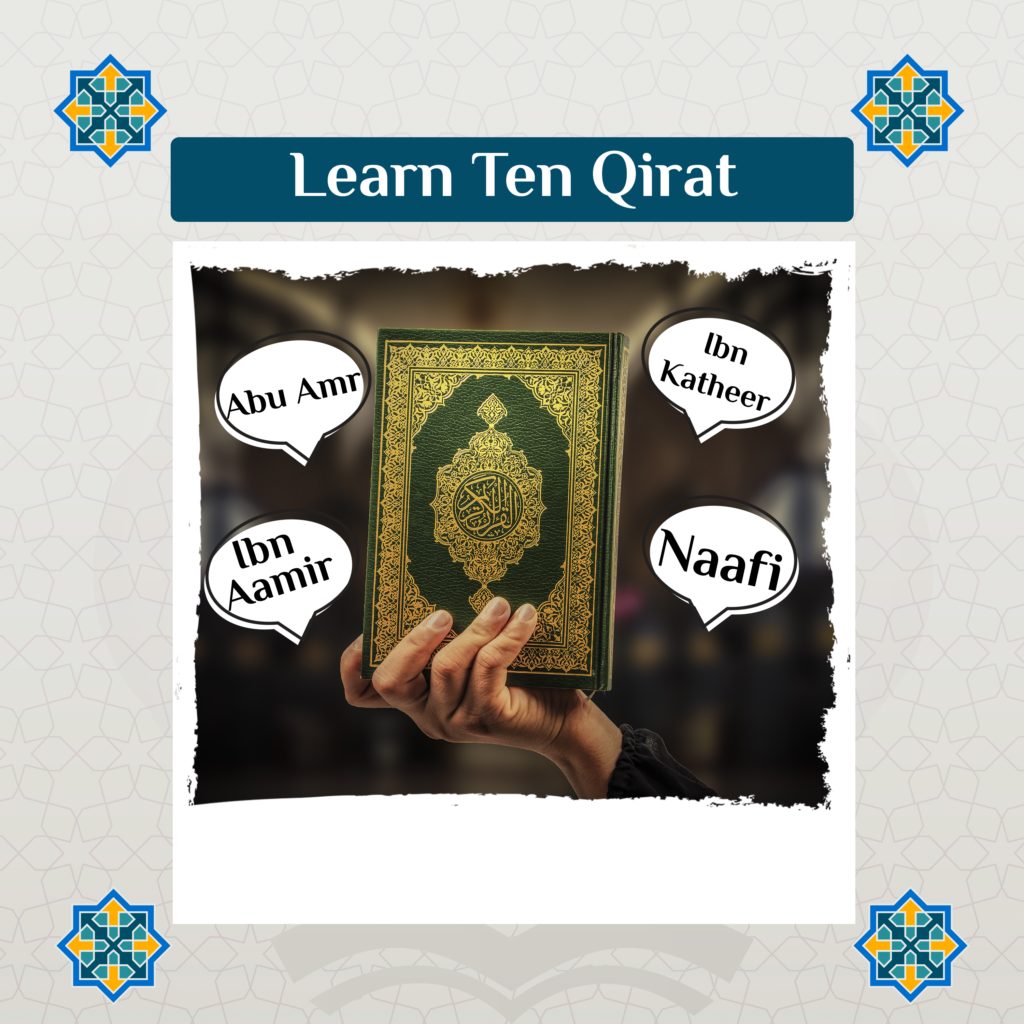What Is Qirat In Quran & Islam
Table of Contents
ToggleAs Muslims, we love to recite the Quran. And we all have our own favorite Qaris too. We love their Qiraat of the Quran so much that we try to copy them here and there. It is their way of recitation that soothes our hearts and souls, isn’t it? Our own reaction to listening to the Qiraat makes us realize its importance. How absorbed and positive we feel after listening to the Qiraat of the Quran! That feeling makes us question how to learn the Qiraat of the Quran? Unquestionably, we will love to learn it and recite the Quran.
Undoubtedly, there has always been a certain way of reciting the Quran. As it is mentioned in Surah Muzammil’s verse 4:
Allah Subhanahu Wa Ta’ala says:
“Or add to it, and recite the Qur’an with measured recitation.”
Also, there is another hadith that tells us the importance of the way of our recitation.
Prophet Muhammad (PBUH) says:
“Beautify the Quran with your voices.” (Nasa’i 1015)
Qiraat is one such element that adds beauty to our recitation. How many of us may wonder what Qiraat is? Let’s answer their questions!
What Is Qirat!
It sounds similar to the name of our holy book- Quran. Isn’t it?
Well, the word Qirah (Plural Qiraat), is derived from the concept of the Arabic term for recitation, Tilawah, or the act of readings and reciting right from the memory. And we all know, our Holy Quran was revealed to our beloved Prophet Muhammad (Peace Be Upon Him). Hence, Qiraat can be explained as the difference in linguistic, phonetic, and syntactic properties that are permitted to recite the Quran in Islam. Further, the difference in Qiraat of the Quran is seen with vowels and consonants too.
Qirat Meaning!
In simpler words, Qiraat of the Quran can be explained as the way of Reciting the Quran.
Join thousands of Muslim Families who love learning Quran, Arabic and Islamic Studies from the comfort of their Homes.
Learn Quran, Arabic & Islamic Online
7 Types Of Qiraat
The Mutawatir class of the Quran has seven different types of Qiraat. The foremost Quranic expert and scholar in this important topic, Abu Bakr ibn Mujahid, selected each of these Qiraat.
1- Qiraat Naafi’ Al-Madani (Madinah)
This method was primarily used by Imams Malik (R.A). and Ahmad ibn Hanbal (R.A.) to read the Quran. The two Qaris who have kept this reading technique preserved are Qaloon and Warsh.
2- Qiraat Ibn Katheer Al-Makki (Makkah)
This technique was used by Qunbul, Al-Buzzi, and Imam Shafi to recite the Quran. This recitation was further preserved by the Qaris Al-Buzzi and Qunbul.
3- Qiraat Abu Amr al-Basri (Basra)
The two Qaris who have retained this Quranic reading technique are Ad-Doori and As-Soosi.
4- Qiraat Ibn Aamir ash-Shami (Syria)
The two Qaris who memorized and preserved this style of Quranic recitation were Hisham and Ibn Dhakwan.
5- Qiraat Asim Al-Kufi (Kufa)
This technique was frequently used by Imams Abu Hanifa (RA) and Ahmad ibn Hanbal (RA) to recite the Quran. The two Qaris who retained this technique were Hafs and Shuba.
6- Qiraat Hamzah al-Kufi (Kufa)
Famous Qaris Khallad and Khalaf are responsible for preserving this style of reading.
7- Qiraat Al-Kisaa’i (Kufa)
Al-Layth and Ad-Doori are two well-known Qaris who kept this recitation technique.
You may read about another 3 types of Qiraat, summing it up to 10 types of Qiraat. However, the majority of scholars agree upon these 7 types of Qiraat.
Are you also curious to learn the Qiraat too? Here are a few tips that will help you in how to learn the Qiraat of Quran.
Common Qiraat
Hafs Method is the most common Quran Reciting Method that is widely used in Saudi Arabia, Egypt, Africa, Asia, Europe, Australia and many countries all over the world.
Warsh ‘an Naafi’ is one of the main canonical methods of reciting the Qur’an in Maghreb countries (Algeria, Morocco and Mauritania), in West Africa (Senegal, Niger, Mali, Nigeria and others) and to some extent in some areas in Egypt, Libya, Chad, southern and western Tunisia.
How To Learn Qirat Of Quran
Join 10 Qirat Online Course
1- Understand the importance of the Qiraat
We value things that are important to us. And it will not be wrong to say that the Quran is the most valuable thing for us. Unquestionably, in this case, we must learn the Qiraat of the Quran. Imagine the reward, positivity, and blessings that it will attract. SubhanAllah! Just thinking about it fills us with the strong desire to learn and recite the Quran with Qiraat.
2- Follow your favorite Qari
We all connect to the Quran differently when it is recited by our favorite Qari. Try to understand their recitation deeply. Pay attention to every vowel, consonants, and the length of their voices. This will not only motivate you but also help you in developing the good habit of Qiraat.
3- Take professional help
The best way to learn the Qiraat is through hiring a Qari online or enrolling in an academy to learn from the Qari with Ijazah. Let’s get real- Qiraat is not an easy process and any newbie will need the help of professional Quran tutors online. The structured course will help you learn more effectively and without struggle.
4- Revise a lot!
We must always revise our lessons. Revision not only helps us in keeping our memory fresh but also makes our next lessons easy. Also, it helps us in making less errors in our Quran recitation.
5- Never give up!
You may feel tired at some point or you may feel it is too difficult but never give up. Keep your spirits high by thinking about the joy of Quran recitation with Qiraat. And do not forget about the reward it will bring!
It is mentioned in Sahih Muslim (798):
“Verily the one who recites the Quran beautifully, smoothly, and precisely, he will be in the company of the noble and obedient angels. And as for the one who recites with difficulty, stammering or stumbling through its verses, then he will have TWICE that reward.”
History Of Qiraat Quran
7 Qirat Of Quran
The original printed versions of the Quran did not contain vowel diacritics or Rasm value distinctions. It was under the caliphate period of 3rd Caliph Uthman'(R.A) that an official copy of the Quran was included in those early manuscripts. It is reported that Uthman (R.A) followed the Harf style when he copied the Quran while leaving out a few things to provide room for other styles.
However, with the course of time and understanding, many improvements were made. That can be seen in:
- dots were added to distinguish similarly shaped consonants.
- Marks and nunnations in ink of various colors were added to the text.
- Various hues were also swapped out for the modern Arabic writing system’s markings.
Scholars such as Yahya ibn Ya’mar al-Adwani and Nasr ibn ‘Aasim under the permission of Al-Hajjaj also contributed in distinguishing consonants
Now you may wonder, are there different types of Qiraat?
Yes! There are 7 types of Qiraat in the Quran. As an aware Muslim, we many also ponder upon the right Qiraat. But we don’t need to worry much as all varieties of Qiraat have been recited with an authentic chain of narrators dating back to the Prophet of Allah (Peace Be Upon Him). It significantly shows that the Quran is the revelation from Allah SWT and has been preserved throughout the ages.
Final Words
As we know that learning Qirat of the Quran is important for Muslims all across the globe, Mishkah Academy offers: 10 Qirat Online Course for people living in either Muslim or non-Muslim countries. Our highly professional Quran Tutors help students learn different types of Qirat or those wondering how to become a Qari.
Are you also determined to learn the Qiraat of the Quran? Mishkah Academy is one such platform that can help you accomplish your goal! Seek the guidance of our exceptional, experienced, and dedicated tutors online that are certified and gained Ijazah from the renowned institutes such as Al-Azhar University.
Contact us for the free trial class today!
FAQs
Meaning of Qirat
The recitation of the Quran is known as Qirat. It is a central part of the Islamic faith, as the Quran is considered the word of Allah as revealed to the Prophet Muhammad (PBUH). Qirat is the art of reciting the Quran in a melodious and rhythmic tone, with proper intonation and pronunciation. A Qari or Qariah is a person who recites the Quran with proper tajweed (rules of recitation) and recites it with a beautiful tone.
Qirat meaning in Islam
The Quranic recitation is not just about reciting the text. It is a practice that requires a deep understanding of the Quranic text, the context in which it was revealed, and the proper recitation of the words. The Quran is the primary source of guidance for Muslims, and it is vital to recite it with the proper understanding, pronunciation, and intonation. The Quranic recitation is a means of communication between the reciter and Allah, and it is a way to connect with Allah and receive spiritual uplifting and guidance.
10 Qirat of Quran
The 10 Qirat of Quran are the different recitation styles of the Holy Quran. The Quran was revealed to Prophet Muhammad (PBUH) in the Arabic language, and it is the duty of Muslims to recite and understand it in its original form. The 10 Qirat represent the different recitation styles that were passed down by various renowned reciters throughout the history of Islam. These 10 Qirat are of great significance for Muslims as they form the basis for the correct recitation of the Quran.
Each of the 10 Qirat of Quran has a unique sound, tone, pronunciation, and melody. They are different from one another, but they have the same meaning and message. The 10 Qirat provide a variety to the recitation of the Quran, making it more pleasant to listen to and easy to memorize. The different Qirat are used in different parts of the Islamic world, and they have their own rules and regulations for recitation. It is believed that reciting the Quran in different Qirat helps to increase one’s spiritual connection with God.
7 Types of Qirat
The 7 Qirat of Quran refers to the seven accepted ways of reciting the Holy Quran. These are the recitation styles that were approved and passed through the chain of narrators from Prophet Muhammad (PBUH) to his followers. Different countries have different ways of reciting the Quran, but the seven qirats are universally accepted. Each recitation style has its own rules of pronunciation and emphasis on certain words, and each narrator had their unique style.
The seven qirats of the Quran, which are recognized by Islamic scholarship, are named after their renowned reciters. They include, Naafi’ al-Madani, Ibn Amr al-Basri, Abu Amr al-Basri, Ibn Kathir al-Makki, Abu Jafar al-Madani, Asim al-Kufi, and Hamzah al-Kufi. These recitations have become so important that they have been incorporated into Islamic liturgy and are recited in various establishments, ranging from mosques to radio and television programs. Therefore, the Qirats serve as a medium of preserving the Holy Quran for future generations.
One Qirat
Qirat of the Quran has immense significance in Islamic culture. It is an art form that has been practiced for over 1400 years. It is regarded as a noble profession, and those who excel in it receive great respect and honor in Islamic communities. Qirat competitions are held all around the world, and those who excel in the field of Quranic recitation receive high recognition and awards. The Quranic recitation is a source of spiritual upliftment and inspiration for Muslims, and it is one of the most revered practices in Islamic culture.
1 Qirat meaning
The memorization and recitation of the Holy Quran is an essential part of Islamic worship. Muslims make a sincere effort to learn the different Qirat to perfect their recitation, and they consider it an act of worship in itself. The study of Qirat is an intricate subject, and it requires years of dedicated practice and devotion to master. In conclusion, the 10 Qirat of Quran are the treasure of the Islamic world, and they are a testament to the rich history and deep spiritual connection of Muslims with their holy book, the Quran.
Ahruf and Qirat
Ahruf and Qirat provide people with options to recite the Quran in a manner that suits them. The diverse recitation styles make the Quran more accessible and interesting for individuals who may find certain recitations more appealing due to personal preference or cultural background. Moreover, through the Qirats, Muslims can appreciate the diverse linguistic nuances of the Holy Quran, as each recitation emphasizes different aspects of the scripture.






